This article may need to be rewritten to comply with Wikipedia's quality standards.(January 2021) |

Howard Dean was a Governor of Vermont, candidate for President of the United States, and Chairman of the Democratic National Committee. [1]
This article may need to be rewritten to comply with Wikipedia's quality standards.(January 2021) |

Howard Dean was a Governor of Vermont, candidate for President of the United States, and Chairman of the Democratic National Committee. [1]
| Year | Office | Incumbent | Party | Votes | Pct | Challenger | Party | Votes | Pct | 3rd Party | Party | Votes | Pct | |||
|---|---|---|---|---|---|---|---|---|---|---|---|---|---|---|---|---|
| 1982 | VT House | Howard Dean [2] | Democratic | 596 | 66.4% | Timothy K. McKenzie | Citizens | 300 | 33.4% | |||||||
| 1984 | VT House | Howard Dean | Democratic | 1092 | 98.9% | |||||||||||
| 1986 | Lt. Gov. | Susan Auld [3] | Republican | 84,413 | 44.4% | Howard Dean | Democratic | 99,929 | 52.5% | |||||||
| 1988 | Lt. Gov. | Howard Dean | Democratic | 154,660 | 66.5% | Pan B. Zolotas | Republican | 69,731 | 30.0% | Lisa Steckler | Liberty Union | 7,952 | 3.4% | |||
| 1990 | Lt. Gov. | Howard Dean | Democratic | 120,956 | 58.1% | Michael Bernhardt | Republican | 80,706 | 38.7% | |||||||
| 1992 | Gov. | Howard Dean | Democratic | 213,523 | 74.73% | John McClaughry | Republican | 65,837 | 23.04% | |||||||
| 1994 | Gov. | Howard Dean | Democratic | 145,661 | 68.6% | David F. Kelley | Republican | 40,292 | 19.0% | Thomas J. Morse | Independent | 15,000 | 7.0% | |||
| 1996 | Gov. | Howard Dean | Democratic | 179,544 | 70.5% | John L. Gropper | Republican | 57,161 | 22.4% | |||||||
| 1998 | Gov. | Howard Dean | Democratic | 121,425 | 55.6% | Ruth Dwyer | Republican | 89,726 | 41.1% | |||||||
| 2000 | Gov. | Howard Dean | Democratic | 148,059 | 50.4% | Ruth Dwyer | Republican | 111,359 | 37.9% | Anthony Pollina | Progressive | 28,116 | 9.5% |
2004 Democratic presidential primaries : [4]

From January 14 to June 8, 2004, voters of the Democratic Party chose its nominee for president in the 2004 United States presidential election.
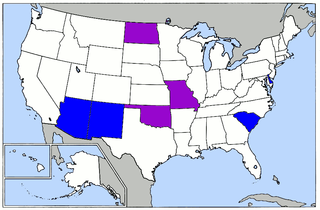
Mini-Tuesday was the name given to the February 3, 2004 U.S. presidential primary where several states, which to that point had participated in "Super Tuesday," cast their votes for the Presidential nominees of the 2004 Presidential election. Mini-Tuesday was also called Super Tuesday I. With the large number of states moving their election dates up to Mini-Tuesday for the 2008 election cycle, pundits have largely shied away from using the term again, instead choosing to reappropriate the term "Super Tuesday" to better represent the primaries held on that approximate date. The date is also known as "Super Duper Tuesday," "Giga Tuesday," and "Tsunami Tuesday," among others, with the term "Mini Tuesday" falling to apparent disuse for the time being.

James Elisha 'Jim' Folsom Jr. is an American politician who was the 50th governor of Alabama from April 22, 1993 to January 16, 1995. He has also served as the lieutenant governor of Alabama on two occasions. He is a member of the Democratic Party.

The 1964 United States Senate elections coincided with the election of President Lyndon B. Johnson by an overwhelming majority, to a full term. His Democratic Party picked up a net two seats from the Republicans. As of 2022, this was the last time either party has had a two-thirds majority in the Senate, which would have hypothetically allowed the Senate Democrats to override a veto, propose constitutional amendments, convict and expel certain officials, or invoke cloture without any votes from Senate Republicans. In practice, however, internal divisions effectively prevented the Democrats from doing so. The Senate election coincided with Democratic gains in the House in the same year.
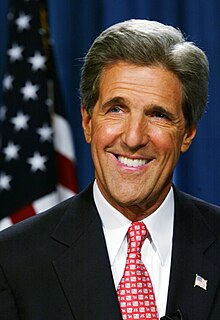
The 2004 United States presidential election in Vermont took place on November 2, 2004, and was part of the 2004 United States presidential election. Voters chose three representatives, or electors to the Electoral College, who voted for president and vice president.

The 2006 United States Senate election in Vermont was held November 7, 2006. Incumbent independent Senator Jim Jeffords decided to retire rather than seek reelection to a fourth term, and Bernie Sanders was elected to succeed him.
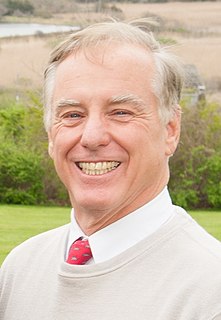
Howard Brush Dean III is an American physician, author, lobbyist, and retired politician who served as the 79th governor of Vermont from 1991 to 2003 and chair of the Democratic National Committee (DNC) from 2005 to 2009. Dean was an unsuccessful candidate for the Democratic nomination in the 2004 presidential election. Later, his implementation of the fifty-state strategy as head of the DNC is credited with the Democratic victories in the 2006 and 2008 elections. Afterward, he became a political commentator and consultant to McKenna Long & Aldridge, a law and lobbying firm.
The Vermont Democratic Party is the affiliate of the Democratic Party in the U.S. state of Vermont.

The 2004 United States presidential election in South Carolina took place on November 2, 2004, as part of the 2004 United States presidential election which took place throughout all 50 states and D.C. Voters chose eight representatives, or electors to the Electoral College, who voted for president and vice president.

The 2004 presidential campaign of Howard Dean, 79th Governor of Vermont, began when he formed an exploratory committee to evaluate a presidential election campaign on May 31, 2002. Dean then formally announced his intention to compete in the 2004 Democratic primaries to seek the Democratic Party's nomination for President on June 23, 2003. Dean dropped out of the race in February 2004 after a poor showing in the Wisconsin primary.
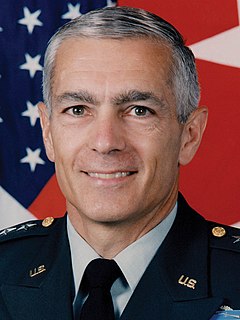
The 2004 Oklahoma Democratic presidential primary, part of the process of selecting that party's nominee for President of the United States, took place on February 3, one of the seven nominating contests of 2004's "Mini-Tuesday". The primary election chose 40 pledged delegates to represent Oklahoma at the 2004 Democratic National Convention. The remainder of Oklahoma's 47 delegates consisted of unpledged superdelegates not bound by the results of the primary. The election was a closed primary, meaning that only registered Democrats could vote in this election. Wesley Clark won the primary by a razor-thin margin over John Edwards.

The 2000 Vermont gubernatorial election took place on November 7, 2000. Incumbent Democratic Governor Howard Dean won re-election. The campaign was dominated by the fallout from the passage of a civil union bill and the subsequent backlash encapsulated by the slogan Take Back Vermont. Ruth Dwyer, the Republican nominee in 1998, ran again in 2000 and was closely tied to the Take Back Vermont movement. Howard Dean, the Democratic governor, favored civil unions and was a primary target of Take Back Vermont.

Vermont's 2012 general elections were held on November 6, 2012. Primary elections were held on August 28, 2012.

A general election was held in the U.S. state of Vermont on November 4, 2014. All of Vermont's executive officers were up for election as well as Vermont's at-large seat in the United States House of Representatives. Primary elections were held on June 3, 2014.

The 2002 Vermont gubernatorial election took place on November 5, 2002. Incumbent Democratic Governor Howard Dean did not run for re-election to a sixth full term as Governor of Vermont. Republican Jim Douglas defeated Democratic candidate Doug Racine and independent candidate Cornelius Hogan, among others, to succeed him. Since no candidate received a majority in the popular vote, Douglas was elected by the Vermont General Assembly per the state constitution.

The 1992 Vermont gubernatorial election took place on November 3, 1992. After Republican Governor Richard Snelling died in office on August 13, 1991, Lieutenant Governor Howard Dean, a Democrat, took over for the remainder of his term. Incumbent Democrat Howard Dean ran successfully for election to a full term as Governor of Vermont, defeating Republican candidate John McClaughry.
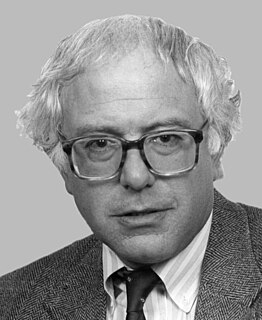
The 1992 United States House of Representatives election in Vermont was held on Tuesday, November 3, 1992 to elect the U.S. representative from the state's at-large congressional district. The election coincided with the elections of other federal and state offices, including a quadrennial presidential election and an election to the U.S. Senate.

The 2020 Vermont gubernatorial election was held on November 3, 2020, to elect the Governor of Vermont. As Vermont does not impose term limits upon its governors, incumbent Republican Governor Phil Scott was eligible to run for reelection to a third two-year term in office. On November 18, 2019, he confirmed that he was running for reelection, but did not yet publicly announce his campaign. On May 28, 2020, he officially announced his candidacy but stated that he would not campaign, maintain a campaign staff, or fundraise because of the state of emergency due to the COVID-19 pandemic in Vermont. The primary was held on August 11. Scott won re-election to a third term, defeating Progressive and Democratic nominee, Lieutenant Governor David Zuckerman. Scott's 41% victory margin was the largest in the state's gubernatorial election since 1996, and the largest for a Republican candidate since 1950.

A general election was held in the U.S. state of Vermont on November 3, 2020. All of Vermont's executive officers will be up for election as well as Vermont's at-large seat in the United States House of Representatives. Primary elections were held on August 11, 2020.